St. Laisrén (also known as Molaise) was an Irish monk of Iona at the turn of the 7th century. Ordained by Pope St. Gregory the Great in Rome around the eyear 600, St. Laisrén served as the pope’s legate to the foundling Scottish churches, specifically to support the Roman doctrine on images against certain Celts who were exhibiting iconoclastic tendencies. St. Laisrén also argued for the Roman calculation of Easter against the Celtic practice.
From his island hermitage off the coast of Scotland’s Arran Isle, Laisrén spent most of his time praying in a cave on the hill of Mullach Mòr. He is the subject of the early Scottish tale called the Vision of Laisren, one of the first pieces of Christian Scottish literature. In this tale St. Laisrén is terrified by a vision of hell in order that he might return and warn his brother monks who were living in half-hearted obedience to their rule. Sadly, the manuscript upon which this tale was written is incomplete, leaving the vision unfinished. We present here what has been found of the Vision of Laisrén.

1. Once upon a time Laisrén went presumptuously from the monastery of Clúain in order to purify Clúain Cháin, a church which is in the territory of Connaught. He fasted thrice three days while purifying the church. At the end of the third three days’ fast, sleep overpowered him in the oratory, and in his sleep he heard a voice saying to him: “Arise!” The first time he did not move. When for the second time he heard the voice he raised his head and made the sign of the cross over his face. Then he saw the church in which he was, all alight, and yet there was still a part of the night. And between the chancel and the altar he saw a shining figure.
2. Said the figure to him: “Come towards me!” At that voice the cleric’s whole body from crown to sole shook. Then all at once he beheld his soul hovering over the crown of his head, and knew not which way she had come out of the body. And he saw the church open above towards heaven, and two angels taking the soul between them and rising into the air.
3. Thereupon he beheld a host of angels coming to meet her. And he saw another host of demons with fiery hair about them and fire coming out of their every limb. On those demons he discerned three shapes: Some had a very black shape, and had fiery bulging spears in their hands; others had a dark brown shape and had fiery darts in their hands. A third number had a shaggy shape, and fiery hair growing through them like the hair of a thistle, and fiery javelins in their hands.
4. Now these three bands formed a single array of battle to wrest the soul from the angels. And one of them, as long as his breath would last, and without change of speech, charged the soul in one charge with what she had done of misdeeds since she was born. That one charge seemed as terrible to the soul, and the demon said nothing but was true, nor did he charge her with anything of which she had made confession to a confessor before leaving the body.
5. An angel of the great host answered the demon on behalf of the soul and said. “Now thou hast charged thy whole charge.” The demon answered and said: “I have not. I have not charged the greater part of it.” The angel answered: “Thy charge can do us no harm, since before leaving the body it has been confessed and atoned for by penance according to the will of a confessor. Be off!” said the angel, ‘You have no share in this man.” “If God’s word be true,” said the demon, “we shall not part this way; for this man has not made a little child of himself as God commanded him” dicens: Nisi conuersi fueritis et efficiamini sicut paruuli, non intrabitis in regnum caelorum.’’ [“Except ye be as little children, ye shall not enter the kingdom of heaven”—Matt. 18:3] . “God’s word is true,” said the angel, “for this man has not come […] to stay with demons, for he will give warning before us to his friends. Depart from us now!” said the angel. Forthwith they departed from them.
6. Thereupon the angel of the great host said to the two angels who were around the soul: “Now take this man that he may see Hell.” Thereupon he is let down northward into a great glen. It seemed as long to him as if he saw from the rising of the sun to its setting. He sees a great pit as it were the mouth of a cave between two mountains, which they entered above. For a long time they went along the cave, until they came to a great high black mountain before them at the mouth of Hell, and a large glen in the upper part of that mountain. This was the nature of that glen: it was broad below, narrow above. That cave was the door to Hell, and its porch.
7. And he saw the folk of the island [i.e., Ireland] whosoever of them were when in the body, under the displeasure of God. They were in the middle of the glen wailing. “Woe, O God!” said the soul. “Has a plague come after us, since all these hosts have perished after us since we find them here?” “Not so,” said the angel, “but whoever is under the displeasure of God during life after thee, here do they behold their souls, and this is their certain fate unless they repent.” “May I speak to each soul whom I see here?” the man asked. “No” said the angel, “lest they despair. Tell them, however, to repent, for whoever shall make repentance and end in it shall not be in this place, but will be in a place of comfort away from this evil, and his repentance will take him past it. And again, he who shall live in righteousness, he sees life while he is in the body, and he shall be in life if he is steadfast in righteousness. Tell them also,” said the angel, “that he who lives in righteousness be steadfast in it, for there is not much time to consider until death comes to them. He, however, who is under the displeasure of God accepts repentance if it be done from a pious heart, and God’s mercy will help him.”
8. Thereupon the man’s soul went into Hell itself, even a sea of fire with an unspeakable storm and unspeakable waves upon it. And he saw the souls aflame in that sea, and their heads all above it; and they wailing and lamenting, crying woe without ceasing throughout the ages. Some of the souls had fiery nails through their tongues, which were sticking out of their heads; others through their ears, others through their eyes.
9. Again, he saw others with their mouths gaping, and the demons compelling them with fiery forks like the other three hosts. The man desired to know the difference of the torments. The angel answered at once, in the way that the guardian angel has always answered thoughts and reflections. “The folk whom thou seest with the fiery nails through their tongues, those are they who have not been praising God or blessing and worshipping Him, and perjuring themselves and blaspheming and talking vaingloriously and
[Here, in the middle of the page, the manuscript breaks off suddenly]
Phillip Campbell, “The Vision of Laisrén,” Unam Sanctam Catholicam, Jan. 15, 2024. Available online at https://unamsanctamcatholicam.com/2024/01/the-vision-of-laisren

